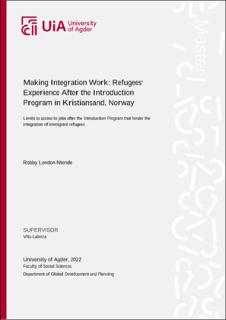| dc.description.abstract | Persisting wars and other atrocities around the world, and especially in non-Western countries, force people to flee their respective countries for their lives and those of their children. Once they arrive in the host countries, mostly Western countries, integrating in a fulfilling way into their new society poses enormous challenges for them. In Norway, the integration of refugees into society and especially into the labor market does not seem to be a success for many despite enormous efforts that the municipalities make through the Introduction Program to facilitate their integration. This research was conducted in the municipality of Kristiansand in Norway. One of the Norwegian municipalities hosting a large number of refugees. The research attempted to explore the difficulties and challenges immigrant refugees face in their daily lives after the Introduction Program. The study focused on the limitations of access to employment after the Introduction Program that hinder the integration of immigrant refugees. Eighteen informants in total were selected using a mixed, purposive and snowball sampling method. Non-Western Refugees in the Post-Introduction Program phase and public officials from NAV and the Introduction Program were interviewed in a semi-structured style, using a qualitative method. The results of this research showed that several challenges related to human capital and social integration hinder refugees from accessing the labour market after the Introduction Program. Challenges such as language proficiency, recognition of their previous studies, approval of their school documents acquired in their country of origin and/or transit, and studies in Norway, constituted in terms of human capital a major challenge to their integration into the labour market. Despite efforts to overcome these challenges and acquire Norwegian human capital, most refugees still do not have access to relevant jobs due to other challenges related to social integration. The difficulty of establishing the social network due to socio-cultural factors, to the mainstream discourse on refugees, pushes natives and especially employers to scepticism, discrimination and social exclusion and thus prevents their integration into the labour market, and in society in general. Strengthening public social integration strategies would facilitate refugees' access to the relevant labour market in the municipality and integrate actively into society. | |
